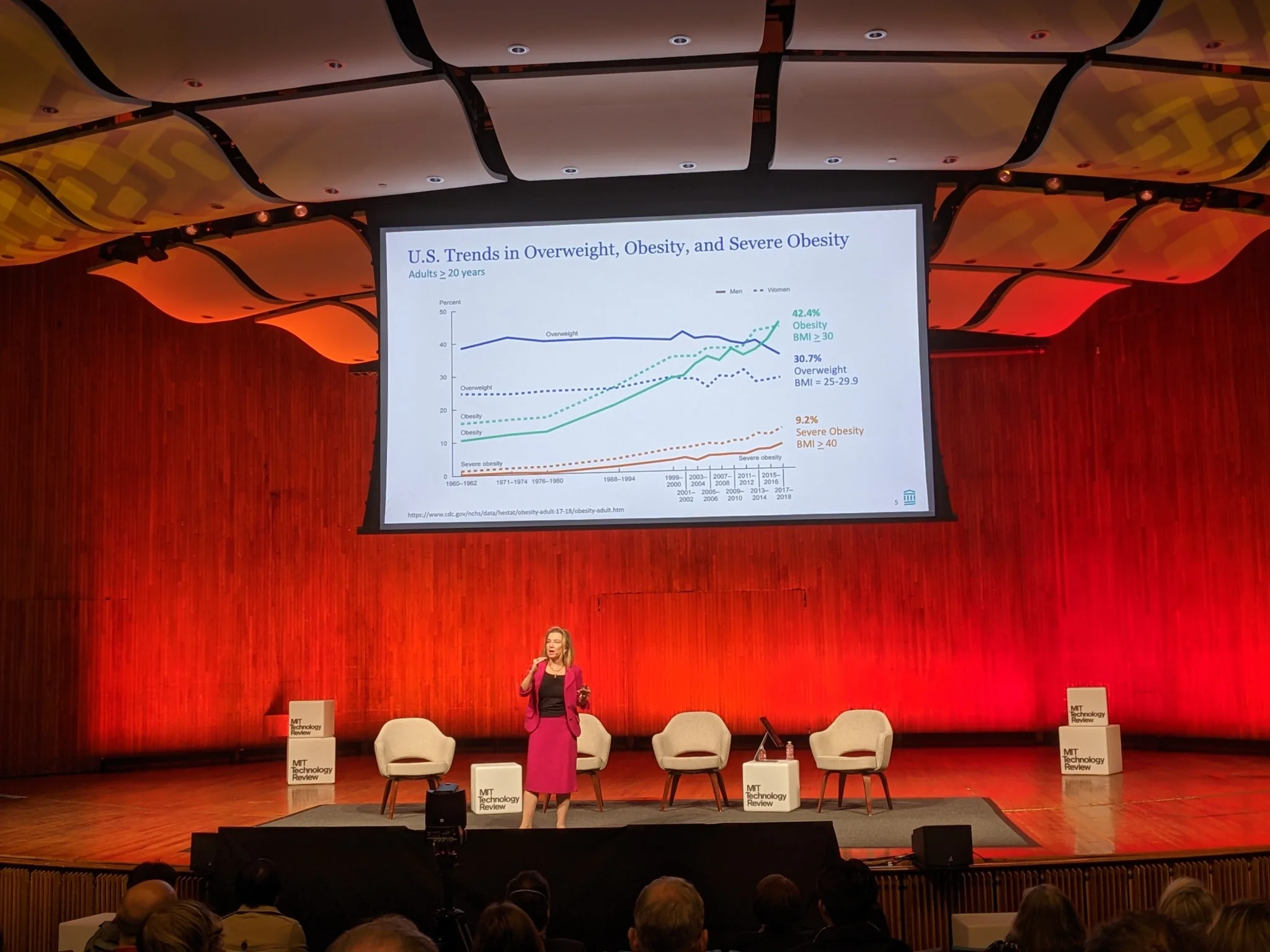New weight-loss drugs like Novo Nordisk's Ozempic and Eli Lilly's Mounjaro are supersizing investment returns. What's driving their popularity?
November 27, 2023
“As a physician, this changes everything. It changes how we look at our food supply, changes how we practice medicine.”
– Caroline Apovian
A new wave of weight loss drugs are taking the world by storm, which are proactively retraining our brain to better recognize when we’re truly full. Keeping our weight in check could be an important step in battling many health conditions before they occur.
Caroline Apovian, the co-director of the Center for Weight Management and Wellness Brigham and Women’s Hospital, recently gave a presentation on these new weight loss drugs at MIT Tech Review’s 2023 EmTech conference.
She first pointed out that obesity is a disease, caused by the way our genes interact with our environment.
Obesity in the US — defined as having a Body Mass Index greater than 30 — began increasing exponentially in the 1970s. This non-coincidentally happened alongside the establishment of many fast food restaurants and ways for us to consume lots of calories without cooking at home.
Scientifically, our brain sends signals to our body throughout the day that make us hungry. This is our natural defense system, to protect our body fat reserves and to keep us from starving to death. Alongside that, we also have another ‘reward system’ that releases dopamine when eating sweets and treats.
The problem is that fast food plays a trick on our brain.
Fast food meals are often high in fat and sugars – so they don’t have fibers that need to be broken down and metabolized by our bodies. That’s why we often don’t feel full after eating drive-through fast food. People typically consume 500 calories more per day when eating highly-processed foods as opposed to when they’re eating vegetables and fibers.
In other words, our eating environment has changed. And it’s changed in a way that’s out-of-sync with our brain’s hardwired response to that environment.

New weight loss drugs such as Novo Nordisk’s (NYSE: NVO) Ozempic (scientific name semaglutide) and Eli Lilly’s (NYSE: LLY) Mounjaro (tirzapatide) are addressing this and could be game-changers for the treatment of obesity.
These new drugs release satiety hormones that are delivered to our brain, helping us better recognize when we’ve actually consumed enough calories to truly be full.
On average, the drugs result in a 13-18% weight loss for the patient; and up to 27% when coupled with daily exercise. That puts them nearly at parity with bariatric surgery, which typically results in around 25% weight loss but also includes a long-list of potential complications.
The American Heart Association recently gave its endorsement as well, with its SELECT scientific study reporting that healthy weight loss reduces the risk of heart attacks and strokes by up to 20%.
While some Primary Care Physicians are still balking at prescribing the new medications, others are embracing the. Insurers like UnitedHealth Group (NYSE: UNH) and others fully cover the drugs for Type 2 diabetes, though patients often typically pay out-of-pocket if it’s primarily used for weight loss.
There’s no doubt that this new trend has been a boon for Novo Nordisk and Eli Lilly’s sales numbers. Novo has sold more than $12 billion worth of weight-loss drugs during the first 9 months or 2023, with sales of Ozempic up 58%. Its weight loss drugs now account for 52% of its total revenue, up from 36% just one year ago. Its $8.4 billion third quarter sales were the highest it’s ever reported. And with a stock price that has quadrupled during the past five years and recently surpassed $400 billion, Novo has taken the crown as Europe’s most valuable company.
Lilly’s Mounjaro has seen similar success. It generated $1.4 billion in third quarter sales and has helped to boost the company’s stock price by 60% YTD.
Apovian concluded by saying “As a physician, this changes everything. It changes how we look at our food supply and it changes how we practice medicine. It will soon be treating obesity first – as a way to prevent Type 2 diabetes and cardiac problems later on.”
This is a crowded field and there are now more than 70 similar medications available for patients to choose from. But with no signs of slowing down any time soon, it appears these blockbuster weight-lost drugs will continue to supersize investment returns.

Already a 7investing member? Log in here.